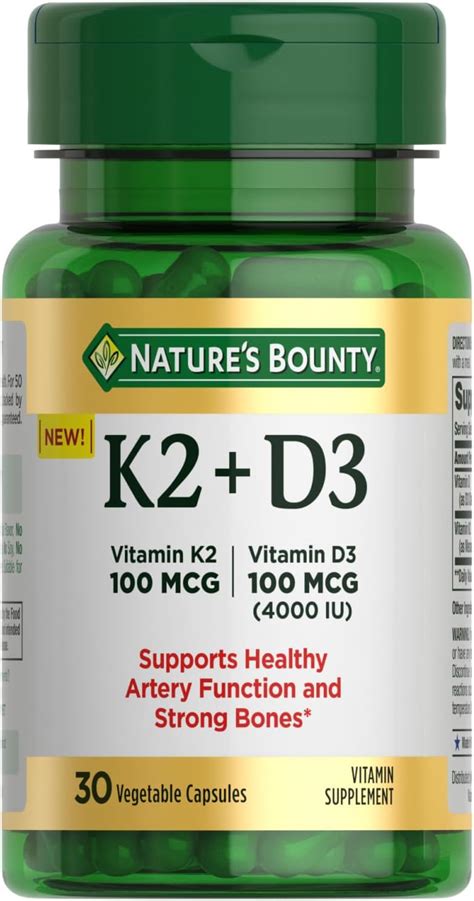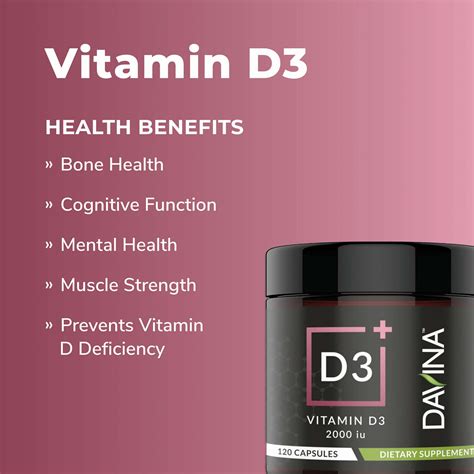Intro
Discover Vitamin D3 Cholecalciferol benefits, including bone health, immune system support, and mood enhancement, with related nutrients like calcium and phosphorus for overall wellness.
Vitamin D3, also known as cholecalciferol, is a type of vitamin D that plays a crucial role in maintaining strong bones, immune function, and overall health. The importance of vitamin D3 cannot be overstated, as it has been linked to a wide range of benefits, from reducing the risk of osteoporosis and fractures to supporting cardiovascular health and cognitive function. In recent years, research has shed light on the significance of vitamin D3 in preventing and managing various diseases, making it an essential nutrient for individuals of all ages. As we delve into the world of vitamin D3, it becomes clear that its benefits extend far beyond bone health, making it a vital component of a healthy lifestyle.
The human body produces vitamin D3 when the skin is exposed to sunlight, which is why it is often referred to as the "sunshine vitamin." However, due to factors such as limited sun exposure, skin pigmentation, and geographic location, many individuals are at risk of vitamin D3 deficiency. This deficiency can have severe consequences, including increased risk of osteoporosis, diabetes, and certain types of cancer. Fortunately, vitamin D3 supplements are widely available, making it easier for individuals to maintain optimal levels of this essential nutrient. With the numerous benefits of vitamin D3, it is essential to understand how it works, its benefits, and how to incorporate it into our daily lives.
Vitamin D3 is not just a vitamin; it is a hormone that plays a critical role in regulating various bodily functions. Its benefits are multifaceted, ranging from maintaining strong bones and teeth to supporting immune function and reducing inflammation. The importance of vitamin D3 is evident in its ability to prevent and manage various diseases, making it a vital component of a healthy lifestyle. As we explore the benefits of vitamin D3, it becomes clear that its significance extends far beyond bone health, making it an essential nutrient for individuals of all ages.
Vitamin D3 Benefits for Bone Health

How Vitamin D3 Supports Bone Health
Vitamin D3 supports bone health by regulating calcium levels in the body. It helps the body absorb calcium from food, which is then used to build and maintain bone density. Vitamin D3 also helps to regulate the activity of osteoclasts, cells that break down bone tissue. By maintaining a balance between bone formation and resorption, vitamin D3 helps to maintain strong and healthy bones. Additionally, vitamin D3 has been shown to reduce the risk of osteoporosis and fractures, making it an essential nutrient for individuals at risk of these conditions.Vitamin D3 Benefits for Immune Function

How Vitamin D3 Supports Immune Function
Vitamin D3 supports immune function by regulating the activity of immune cells. It helps to activate immune cells, such as T-cells and macrophages, which are essential for fighting off infections. Vitamin D3 also helps to reduce inflammation, which can exacerbate autoimmune diseases. By maintaining a healthy balance of immune cells and reducing inflammation, vitamin D3 helps to support immune function and reduce the risk of autoimmune diseases.Vitamin D3 Benefits for Cardiovascular Health

How Vitamin D3 Supports Cardiovascular Health
Vitamin D3 supports cardiovascular health by regulating blood pressure and reducing inflammation. It helps to activate cells that regulate blood pressure, which can help to reduce the risk of heart disease and stroke. Vitamin D3 also helps to reduce the formation of blood clots, which can block blood vessels and lead to heart attacks and strokes. By maintaining a healthy balance of blood pressure and reducing inflammation, vitamin D3 helps to support cardiovascular health and reduce the risk of heart disease and stroke.Vitamin D3 Benefits for Cognitive Function

How Vitamin D3 Supports Cognitive Function
Vitamin D3 supports cognitive function by regulating the activity of brain cells. It helps to activate cells that regulate learning and memory, which can help to improve cognitive function. Vitamin D3 also helps to reduce the formation of beta-amyloid plaques, which are a hallmark of Alzheimer's disease. By maintaining a healthy balance of brain cells and reducing inflammation, vitamin D3 helps to support cognitive function and reduce the risk of dementia and Alzheimer's disease.Vitamin D3 Benefits for Cancer Prevention

How Vitamin D3 Supports Cancer Prevention
Vitamin D3 supports cancer prevention by regulating the activity of cells. It helps to activate cells that regulate cell growth and division, which can help to prevent the formation of cancerous tumors. Vitamin D3 also helps to reduce the formation of free radicals, which can damage DNA and lead to cancer. By maintaining a healthy balance of cells and reducing inflammation, vitamin D3 helps to support cancer prevention and reduce the risk of certain types of cancer.Vitamin D3 Benefits for Diabetes Prevention

How Vitamin D3 Supports Diabetes Prevention
Vitamin D3 supports diabetes prevention by regulating blood sugar levels. It helps to activate cells that regulate insulin sensitivity, which can help to prevent the development of insulin resistance and type 2 diabetes. Vitamin D3 also helps to reduce the formation of advanced glycosylation end-products (AGEs), which can damage tissues and lead to diabetes. By maintaining a healthy balance of blood sugar levels and reducing inflammation, vitamin D3 helps to support diabetes prevention and reduce the risk of type 2 diabetes.What is the recommended daily intake of vitamin D3?
+The recommended daily intake of vitamin D3 varies by age and other factors, but most adults need at least 600-800 IU per day.
Can I get enough vitamin D3 from sun exposure alone?
+No, it is difficult to get enough vitamin D3 from sun exposure alone, especially during the winter months or for individuals with limited sun exposure.
Are vitamin D3 supplements safe to take?
+Yes, vitamin D3 supplements are generally safe to take, but it is essential to follow the recommended dosage and consult with a healthcare professional before starting any supplement regimen.
Can vitamin D3 help with weight loss?
+Some research suggests that vitamin D3 may help with weight loss, but more studies are needed to confirm this benefit.
Can I take vitamin D3 with other medications?
+It is essential to consult with a healthcare professional before taking vitamin D3 with other medications, as it may interact with certain medications or exacerbate underlying health conditions.
In conclusion, vitamin D3 is a vital nutrient that offers numerous benefits for overall health and well-being. From supporting bone health and immune function to reducing the risk of cardiovascular disease and certain types of cancer, vitamin D3 plays a critical role in maintaining optimal health. By understanding the benefits of vitamin D3 and incorporating it into our daily lives, we can take a proactive approach to preventing and managing various diseases. Whether through sun exposure, supplements, or dietary sources, it is essential to prioritize vitamin D3 intake to reap its numerous benefits. We invite you to share your thoughts and experiences with vitamin D3 in the comments below and to explore other articles on our website for more information on maintaining optimal health and well-being.
